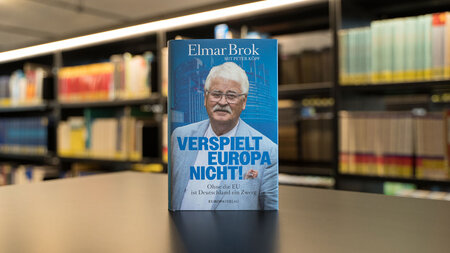Study Pilot
The programme is for 2 years and spans 4 semesters which includes your internship and master thesis. Given below is an example structure of your master's programme that you can use to create your study plan. This is only supposed to serve as an example so, you can move around the courses as you please. That being said, it is important to notice that some subjects are offered only in the winter or the summer semester. This information and detailed module description is given in the study documents. Please refer to these documents before structuring your study plan.

1. Semester
Initial Preparation
Inform yourself about the location of the lecture hall on the Campus room finder. Make yourself familiar with the OPAL learning content portal and the schedule of your courses study plan (only in German).
Mandatory Courses in the first semester:
- Mathematics for Engineering Science (5 Credit Points (CP))
- Resource Efficiency from an Economic Perspective (5 CP)
- Digital Manufacturing (5 CP)
- Additive Manufacturing (5 CP)
- Research Methods (5 CP)
- Language course-1 (preferably German A2 course) (5 CP)
Objectives for the first semester
- Decide your profile
- Create and submit your study plan
- Familiarize yourself with all the portals and websites
- Start work on your resume and cover letter
- Know how to read, write and review scientific reports
- Can read, write and speak basic German
- Register for the next semester
Research Methods
It was often observed that students lacked the skills to conduct independent scientific research that involves searching scientific articles in the scientific databases, understanding the findings, and presenting the findings in the form of a paper, poster, or a thesis. The research methods module was introduced to solve this problem.
As a part of this module, you will be taught the key principles of scientific work and how you should use them in your own work. Furthermore, you will also be taught how to write a holistic scientific paper that successfully incorporates all aspects of a paper from the abstract till the conclusion. Successful completion of this module is compulsory to finish your masters.
Using everything you learnt, you are expected to submit your own scientific review paper on a topic of your choice for the final examination. In addition to the review paper, you should also present your findings in the Advanced Manufacturing Students Conference as a presentation.
Advanced Manufacturing Students Conference
Language courses
To ensure that you can start with the higher German levels at TU Chemnitz, A1 German level skill has been set as a requirement for applying for TU Chemnitz. Having completed the first level before becoming a student, you can directly start with the next levels as soon as you become a student of the university. This will prepare you to take part in the mandatory B1+ course available for the Advanced Manufacturing students. It is a course which imparts the much needed mechanical engineering related grammar and vocabulary to you, that you might find a job easily when you graduate from TU Chemnitz. Your speaking, writing and hearing skills must be of the A2 level so that you can understand this course. From the 2024-25 Winter semester onwards, a new requirement has been set which says that the presentation of your master thesis must be carried out in German. You can choose if you want to answer the questions in German or English. Hence we highly encourage you to do your best to acquire German language skills, as it will also be extremely beneficial for finding a job in Germany after your graduation.
A list of languages taught in the university are given in the website of Center for Foreign Languages. Though the option to learn a new language exists, it is highly recommended that you have a B2 level of German language to increase your chances of getting an internship, HiWi or Student work.
In total, you need to complete 2 language courses to achieve the required grade points for your master's programme. It is not possible to acknowledge previous language experiences (e.g. Goethe Certificates, Duolingo)
2. Semester
Courses
- Profile course-1 (5 CP)
- Profile course-2 (5 CP)
- Profile course-3 (5 CP)
- Profile course-4 (5 CP)
- Elective course-1 (5 CP)
- Language course-2 (preferably German B1 course) or Elective Course-2 (5 CP)
Semester Objectives
- Finish almost half of your modules
- Can read, write and speak intermediate level German
- Have a broad idea of what field you want to work in
- Apply for student jobs at the university
- Register for the next semester
3. Semester
Courses
- Applied Engineering Project (10 CP)
- Deutsch für Ingenieure (Niveau B1+) (5 CP)
- Profile course-5 (5 CP)
- Profile course-6 (5 CP)
- Profile course-7 (5 CP)
Semester Objectives
- Finish the Applied Engineering Project
- Finish all your courses
- Know which field you want to work in the future
- Start looking for thesis topics in that field
- Acquire complementary skills like Python, Electronics, etc.
- Can read, write and speak engineering related German
- Register for the next semester
Applied Engineering Project
It has been observed that students lose a lot of time- about 6 months, for searching for an internship at a company. Additionally, an internship often brings with it the necessity to move to another city. This poses problems like searching for a room to live, city registration and repeating the same process in Chemnitz once done with the internship. Moving to another city also implies that the students can no longer attend lectures at TU Chemnitz, leading to a semester being wasted. Doing a research project at the university instead of an internship at a company helped solved some major issues like moving to another city. Students could continue living in Chemnitz in their student dorms thus making it possible to attend the lectures at the university. But this option brought the disadvantage that the research projects were sometimes too theoretical.
To circumvent these issues, the Applied Engineering Project was the new initiative introduced. In this project, you have to work on real-life problems faced at companies. The style of the project is competition style, because more than 2 teams of students will be working on a single problem statement. As the best solution will be implemented by the company, this gives the student teams the motivation to think outside the box and to look at the problem statement from different perspectives before proposing the final solution to a company. The university is responsible for finding the companies, their problem statements and also assigning supervisors to every student team. This relieves you of a lot of pressure and also provides the opportunity of working on the project from Chemnitz. Additionally and more importantly, you will not lose a semester as you will be in Chemnitz and can attend your lectures at the university.
4. Semester
Courses
- Master Thesis (30 CP)
Semester Objectives
- Start looking for a full-time job
- Can hold conversations in German
- Prepare the Master Thesis presentation in German
- Have a clear idea on which field you want to work in the future
Master Thesis
The master thesis is the culmination of all your studies in TU Chemnitz. It officially starts with the submission of an official document containing the topic and the signature of your supervisor, to the examination office. The examination office will then provide you with a submission date in accordance with the workload written in the master program study regulations. The prerequisite for submitting this document is completion of modules amounting to 85 LP.
Topics for the Master Thesis can be supervised by every professor of faculty of Mechanical Engineering. Suitable topics are announced in department-specific ways: online, on noticeboards or on request. Therefore, it is your (the students') task to inquire about a topic of your choice. We recommend browsing through the websites of the various professorships to get an idea about the field of their research activities. Then respond to (online)offers of your interest or kindly ask for suggestions from the specific professor if you found research areas that caught your attention. Or approach the professor with an outline of your own project idea. In this case, be flexible enough to respond to suggestions deviating from your original plans. In principle, also topics from Electrical Engineering or IT would be possible; in this case, please check back with Prof. Odenwald after a first contact with the prospective supervisor.
The master thesis can be done also with a company. If you intend to do so, you need to start searching for it well in advance to prevent any delays with your studies. An important thing you need to keep in mind is to ask the company if your research work can be published as a thesis. This needs to be clarified before signing the contract. Furthermore, like an internship, you must contact a professor from the university and ask him to be your supervisor as soon as you receive the offer to do the thesis with a company and BEFORE SIGNING ANY CONTRACT.
This process has been detailed in the flowchart below.
- 1 -
Choose your field of interest - 2 -
Identify a department within TUC corresponding to that field - 3 -
Approach a professor from that department and request him to be your supervisor - 4 -
Receive project description from the professor - 5 -
Register at the examination office - 6 -
Work on the thesis - 7 -
Regular supervising meetings - 8 -
45 min presentation and defense of thesis - 9 -
The Professor sends the grade to the examination office - 10 -
Final Grade for thesis / Final Grade for presentation and defense
Master Thesis Topics
- Professorship Adaptronics and Lightweight Design (in Production)Univ.-Prof. Dr. Welf-Guntram Drossel
- Professorship Advanced PowertrainsUniv.-Prof. Dr. Thomas Unwerth
- Professorship of Ergonomics and Innovation ManagementUniv.-Prof. Dr. Angelika Bullinger-Hoffmann
- Professorship of Electron Microscopy and Microstructural AnalysisUniv.-Prof. Dr. Andreas Undisz
- Professorship of Factory Planning and Intra LogisticsUniv.-Prof. Dr. Matthias Thürer
- Professorship Vehicle System DesignUniv.-Prof. Dr. Ralph Mayer
- Professorship of Production Measurement TechnologyUniv.-Prof. Dr. Sophie Gröger
- Professorship of Solid MechanicsUniv.-Prof. Dr. Jörn Ihlemann
- Professorship of Conveying Engineering and Materials HandlingUniv.-Prof. Dr. Markus Golder
- Professorship of Plastics TechnologyUniv.-Prof. Dr. Andreas Seefried
- Professorship of Machine Components and Product DesignUniv.-Prof. Dr. Alexander Hasse
- Professorship of Micromanufacturing TechnologyUniv.-Prof. Dr. Andreas Schubert
- Professorship of Assembly and Handling TechnologyUniv.-Prof. Dr. Maik Berger
- Professorship of Printed Media TechnologyUniv.-Prof. Dr. Arved Carl Hübler
- Professorship of Production Systems and ProcessesUniv.-Prof. Dr. Martin Dix
- Professorship of Welding EngineeringUniv.-Prof. Dr. Jonas Hensel
- Professorship of Sports Equipment & TechnologyUniv.-Prof. Dr. Stephan Odenwald
- Professorship of Lightweight Structures and Polymer TechnologyUniv.-Prof. Dr. Lothar Kroll
- Professorship of Fluid MechanicsUniv.-Prof. Dr. Markus Richter
- Professorship of Applied Mechanics and DynamicsUniv.-Prof. Dr. Michael Groß
- Professorship of Technical ThermodynamicsUniv.-Prof. Dr. Markus Richter
- Professorship of Textile TechnologiesUniv.-Prof. Dr. Holger Cebulla
- Professorship of Forming TechnologyUniv.-Prof. Dr. Till Clausmeyer
- Professorship of Composites and Material CompoundsUniv.-Prof. Dr. Guntram Wagner
- Professorship of Virtual Production Engineering is now a part of Professorship of Forming TechnologyUniv.-Prof. Dr. Till Clausmeyer
- Professorship of Materials and Surface EngineeringUniv.-Prof. Dr. Thomas Lampke
- Professorship of Materials EngineeringUniv.-Prof. Dr. Martin Wagner






